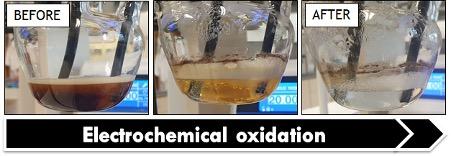Powerful electrochemical process destroys water contaminants, such as pesticides

Credit: Julia Ciarlini Jungers Soares, University of Sydney
A team of engineers may be one step closer to cleaning up heavily contaminated industrial wastewater streams.
Researchers from the School of Chemical and Biomolecular Engineering developed an electrochemical oxidation process with the aim of cleaning up complex wastewater that contained a toxic cocktail of chemical pollutants.
“Our study, published in Algal Research, involved industrial wastewater that had been heavily contaminated with a cocktail of organic and inorganic species during a biofuel production process”, said Julia Ciarlini Jungers Soares, who is completing a PhD in Chemical and Biomolecular Engineering under the supervision of Dr Alejandro Montoya.
The wastewater, which contained carbon, nitrogen and phosphorus, was generated in a pilot plant, designed by the team for the production of biofuels using naturally abundant microalgae.
The process involved treating wastewater with electricity using specialised electrodes. They discharged electricity, then drove oxidation reactions near the electrode surfaces, transforming the organic contaminants into harmless gasses, ions or minerals.
The water before, during and after treatment. Photo credit: Julia Ciarlini Jungers Soares, University of Sydney
“We have employed an incredibly powerful process that eliminates even the most persistent non-biodegradable pollutants, such as pharmaceuticals and pesticides, as well as various classes of organic compounds that can be found in many industrial effluents,” she said.
“The process is relatively simple, does not require the addition of chemicals or severe operation conditions, and does not produce additional waste streams.”
“Wastewater is a significant issue for our environment, as well as for many industries who use substantial volumes of water in their processes, such as in reactions, transport, and washing and cooling. Finding suitable solutions for reuse or disposal is often very challenging and costly.
“The electrochemical method that we used can be readily applied to industries that must comply with strict regulations for wastewater disposal, such as pulp and paper processing, wineries, as well as pharmaceutical production facilities.
“Worldwide, researchers are investigating methods for the development of biofuels from algae. Developing alternatives for the treatment and reuse of this industrial effluent is a hot research topic and can bring opportunities for energy and resource recovery within a circular bio-economy framework.”
The team will soon carry out research focused on specific contaminants to better understand the chemical transformations that take place during electrochemical oxidation and will upscale the process.
A 2017 UNESCO report found that the opportunities from exploiting wastewater as a resource were vast, and that safely managed wastewater is an affordable and sustainable source of water, energy, nutrients and other recoverable materials.
###
DISCLOSURE:
The researchers have no conflicts of interest to declare. The research was supported by a University of Sydney Engineering and Information Technology Research Scholarship.
THE RESEARCH:
Please contact Luisa Low for a PDF copy of the research.
MEDIA CONTACT:
Luisa Low, Media and PR Adviser (Engineering), University of Sydney
+61 438 021 390
[email protected]
Media Contact
Luisa Low
[email protected]
Original Source
https:/
Related Journal Article
http://dx.




